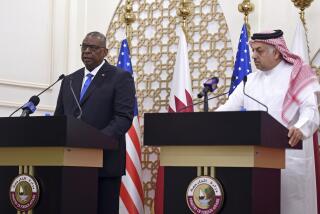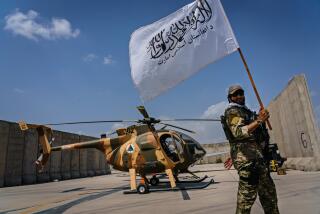Gates gets sobering war update on Afghan visit
- Share via
Reporting from Kabul, Afghanistan — Secretary of Defense Robert M. Gates received a sobering update on security in eastern Afghanistan during a visit Tuesday, reflecting the uneven nature of the Obama administration’s claims to be making progress in suppressing the Taliban insurgency.
Gates and other officials are in a difficult position, arguing that the troop increase is beginning to show signs of turning around the 9-year-old war but also conceding that stability in Afghanistan, and large-scale withdrawals of U.S. and European forces, may not be possible before 2014.
FOR THE RECORD:
Obama in Afghanistan: A Dec. 8 article in Section A about Defense Secretary Robert M. Gates’ visit to Afghanistan said President Obama visited Kabul, the nation’s capital, last week. In fact, he traveled to nearby Bagram airfield; dust storms prevented him from flying to the capital. —
Eastern Afghanistan is one of the places where insurgents remain potent.
Briefing Gates at an outpost in Kunar province, Lt. Col. J.B. Vowell, commander of the U.S. Army’s 2nd Battalion, 327th Infantry Regiment, said there had been a “surge in fighting” since his battalion arrived in March and that during the summer attacks ran well above 2009 levels.
Vowell attributed the increase in violence in the remote and rugged province in part to the presence of additional U.S. troops, which he said allowed the Taliban to recruit fighters in a place known for its isolation and hostility to outsiders, including the Afghan government in Kabul.
“The people [in Kunar] are going to put a foot in both camps,” Vowell said. “They’re going to wait it out.”
Reporters were allowed to listen to the first five minutes of the briefing.
The Defense secretary arrived at Bagram airbase, north of Kabul, almost exactly a year after a White House decision to deploy 30,000 additional U.S. troops. He then flew by helicopter to two U.S. bases near the Pakistani border, and later met with Army Gen. David H. Petraeus, the top U.S. commander in Afghanistan.
American officials said his findings on the trip would inform an upcoming White House review of the war strategy.
Though the White House once described the review as a key assessment of the strategy announced last year, U.S. officials lately have played down its importance and have insisted that they see signs of progress, despite little public evidence that the insurgency is weakening.
A senior Defense official said the White House review is likely to conclude that the troop increase has “enabled the expansion” of security in the southern provinces of Helmand and Kandahar, as well as small pockets in the east, but that “there is a good deal more that needs to be done.”
Gates was scheduled to meet with Afghan President Hamid Karzai on Wednesday.
“We believe that we have arrested the momentum of the Taliban in many parts of Afghanistan,” Petraeus told reporters travelling with Gates. But the general added that “clearly again, the Taliban does still have areas in which it has the freedom of movement and arguably momentum.”
Army Maj. Gen. John Campbell, the commander in eastern Afghanistan, told reporters after the meeting with Gates that his men were in a “tough, tough fight” and “a long fight,” especially along the border with Pakistan, though he emphasized that “it’s not grim everywhere” and that he saw gains daily.
The fighting in Kunar has been intense. During his stop at the outpost, Gates awarded six soldiers silver stars, the U.S. military’s third-highest award for valor.
Gates’ visit came four days after President Obama made a surprise visit to Kabul, the capital, and a little more than a week after six American soldiers were killed by an Afghan border police officer. Gates met privately with surviving members of the platoon at a U.S. base in the eastern province of Nangarhar.
He later addressed several hundred U.S. troops in the platoon’s battalion.
“I know you all have had a rough go of it” and taken “a lot of losses,” Gates said, emphasizing that the losses were worth it because “this is an important mission.”
More to Read
Sign up for Essential California
The most important California stories and recommendations in your inbox every morning.
You may occasionally receive promotional content from the Los Angeles Times.











